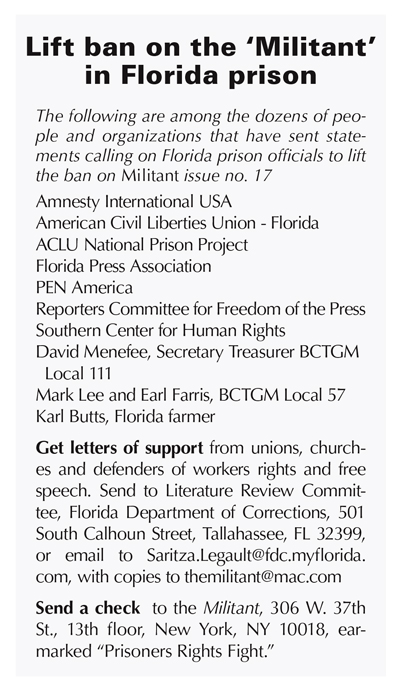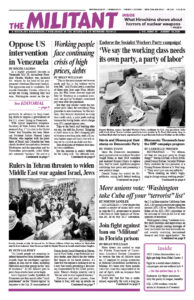More letters are needed to urge the Florida Department of Corrections Literature Review Committee to reverse the ban of Militant issue no. 17 imposed by prison authorities at Jackson Correctional Institution in Malone. It’s been over three months since this issue was impounded at the end of April, with no response from the committee.
Every day that this ban is maintained, especially for such a long period of time, is a serious violation of the constitutional rights of prisoners to read and discuss political literature of their choice, as well as the right of the Militant to reach its readers behind bars, the numbers of whom continue to grow.
Upon learning about the ban, the Militant promptly filed an appeal. The Literature Review Committee informed Militant attorney David Goldstein that it would hold a hearing July 18 to review the prison authorities’ impoundment. But it’s been three weeks since then and no information on its ruling has been communicated to the Militant or its attorney.
Prison authorities objected to the Militant printing a widely circulated Associated Press photo showing the body of a Jewish man murdered by Hamas during its murderous Oct. 7 pogrom in Israel being driven around Gaza City to cheers by the Islamist thugs’ supporters.
Jackson Correctional Institution officials wrote: “Picture shows dead person being paraded around on a motorcycle. Magazine depict hatred toward a specific race.”
Prison authorities claim the photo is “dangerously inflammatory,” encouraging “riot, insurrection, rebellion” and “organized prison protest.”
This photo appeared above another photo showing a Jewish family that survived a 1906 pogromist assault in Belostok, in what is now Poland. These and other photos accompanied a four-page feature reprinting the opening chapter of a new Pathfinder book, The Fight Against Jew-Hatred and Pogroms in the Imperialist Epoch: Stakes for the International Working Class.
“While the article discusses the historical reality of discrimination, and the photograph itself depicts the aftermath of violence, they do not show, much less celebrate violent acts or advocate ‘hatred toward a specific race,’” wrote The Reporters Committee for Freedom of the Press in the letter it sent to the Literature Review Committee in June. “On the contrary, far from encouraging violence, the headline, subheadlines, and text of the article, decry violence and convey a clear message against ‘hatred toward’ any specific group.”
A number of other prominent organizations defending civil liberties and prisoners’ rights have sent letters to the Literature Review Committee, from the American Civil Liberties Union National Prison Project and the ACLU’s Florida chapter to the Florida Press Association, which represents 146 publications across the state, from the Miami Herald to the Pensacola News Journal. (see list below). More letters are needed!


